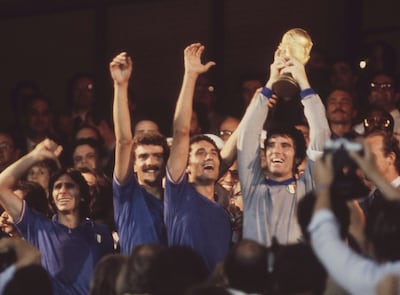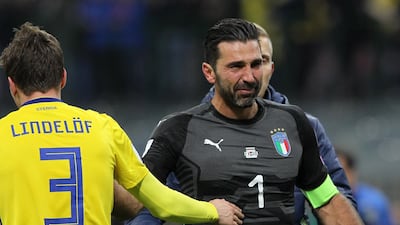The newspaper headlines blared “Blue Apocalypse” and “The End”. It was the morning after Italy's football team failed for the first time in more than five decades to qualify for the World Cup and the public mood was every bit as bleak as the headlines suggested.
Alessandro Mattiolo, 30, was still in a state of shock as he recounted the moments after the nil-nil draw against Sweden doomed the Italian national team. He said in silent incredulity, staring at a wall.
“The disappointment was immense. [For me] this is the first time that we won’t be taking part in a World Cup. My generation has no recollection of a disappointment of this proportion,” said the young lawyer from Rome. “It’ll be difficult to follow the World Cup, it’s not conceivable for us — we're the team that have the second highest number of World Cups.
Those who can remember the first time failed to qualify, back in 1958, when the Azzurri (Blues) were beaten 2-1 by minnows Northern Ireland, were just as bitter. “I’m deeply disappointed,” said Umberto, 71, who owns a restaurant. “Football [in Italy] mirrors our current political and economic situation — I’m abandoning both politics and football. ”
_______________
Read more:
Italy's World Cup 'Apocalypse' caused by decade-long decline and Ventura's ill-fated reign
Italy fail to qualify for World Cup after draw with Sweden
_______________
Umberto was just 12 when he first witnessed that first World Cup failure. The streets of Campello sul Clitunno, the small town in the heart of Italy where he lives were near deserted on Tuesday as he reflected on a national mood that was both sombre and indignant. In a country increasingly disenchanted with its political elite and economic woes, the failure of the Azzurri to qualify for the World Cup has only added to the widespread disillusionment.
“Whether they lose or win, they still get paid. [The players] don’t care about the game,” said Umberto. “Football has become a way to cover up [other] problems.”
For Paolo Gaudenzi, another resident of Campello, Monday's result was neither a surprise nor a concern.
“To me [football] is not a priority. The priorities are our everyday problems, like the fact that schools and hospitals aren’t working properly,” he said.

A stone's throw away, in a half-empty cafe a 70-year-old doctor was finishing his coffee as he bellowed, "[The game] is the mirror-image of Italy's decadence!" He went on, "Prime minister Gentiloni says the financial crisis is over, but that's not true. People are committing suicide because they are unable to pay their taxes, yet we still find money for the banks and for the invaders," he said, using a disparaging term for refugees.
The anguish displayed by the team, especially the grief on the face of the legendary Juventus goalkeeper Gianluigi Buffon, drew sympathy from many Italians. The image of one of Italy's most accomplished and well-loved players with tears in his eyes encompassed a collective sense of sadness felt throughout the country.
"I'm not sorry for myself but for all of Italian football. We failed at something which also means something on a social level," Buffon said after the match. reporters
The angry front pages and biting commentary in the Italian press blamed the "national embarrassment" on coach Gian Piero Ventura.
“I absolutely apologise for the result but not for the effort we put in or our desire to win,” Mr. Ventura said. The 69-year-old coach denies he plans to quit, though critics think he should. Few were ready to contemplate a comeback either for the team or the nation’s fortunes as a whole. Young Italians who have left in search of a better life elsewhere often remark on the irony of refugees dying to reach their country when they have been forced to move abroad.
"There are so many Italians who would love to come home, but can't because our corruption-riddled country has robbed us of any opportunity," said Gaia de Battista, an Italian living in London. "The mistakes of past generations have ruined our future, in particular the entrenched corruption and tax evasion," she added.
In a country where football is more than just a game, there were some who took solace in the long-term view.
"We have pride, strength and we're stubborn. We know how to get back up again as we've always done," Buffon said.
Far from the pitch, in the small town of Campello, Umberto the restaurateur echoed that sentiment. "We've gone through wars, we'll get through this."

